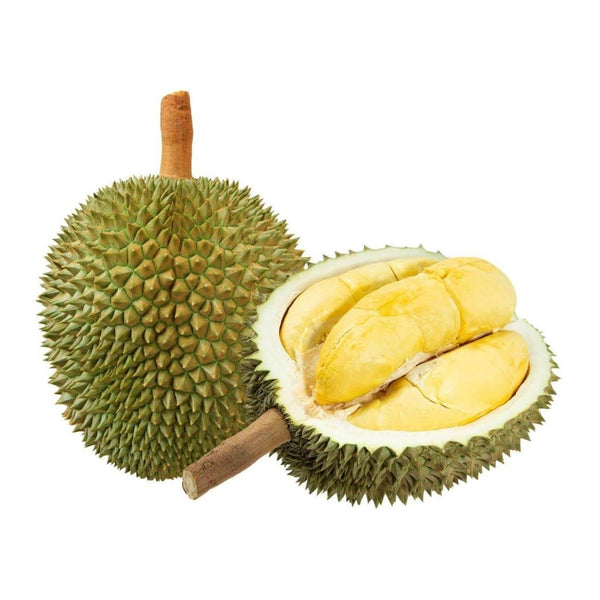
- ~30 lbs
- Seasonally sourced from Thailand and Malaysia.
- Durian aka "King of Fruits", "Liu-Lian", "榴莲", "榴蓮"
- Durian has a similar appearance as jackfruit but is much smaller in size and with prickly spines on the skin. The most significant feature of durian is the smell of the fruit. Durian has a strong aroma that some people compare to raw sewage. Inside, the flesh is separated by smooth-walled compartments. Durian usually consists of three to five compartments, each containing one to six glossy, creamy to reddish-brown seeds covered by the soft pulp. The flesh is light yellow with a creamy, custard-like texture. The flesh can be odorless or have a strong aroma of garlic, onion, or pungent cheese with a hint of fruitiness. Durian has a sweet, custardy flavor with hints of vanilla.
Handling Tip
Selection
- Durian stalk is moist, light brown in color, and thick.
- Smell near the durian stem for a strong aroma but not overpowering.
- Check the durian thorns. Bright green thorns mean that the fruit is still unripe. Dry brown thorns represent that the fruit is overripe. Look for green thorns with brown tips for the perfect ripeness.
Storage
- Durian should be stored at 59ºF (15ºC) with a relative humidity of eighty-five to ninety-five percent and no mist.
- The typical shelf life is four weeks.
- Fruit ripened at a lower relative humidity of seventy-five percent has a better eating quality and is less juicy and easier to dehusk than fruit ripened at higher relative humidity.
- Durian is an odor producer. Do not store durian with odor-sensitive products.
- Durian is sensitive to ethylene, a naturally occurring gas that regulates ripening. Durian should not be stored with high ethylene-producing products to extend shelf life and avoid husk browning. Immature durian produces near-zero ethylene that drastically increases as the fruit ripens.
- Durian is sensitive to chilling injury at below 59ºF (15ºC). Symptoms include peel browning, loss of aroma, recessed areas on the surface, and fruit not softening. As the fruit ripens, it becomes less sensitive to chilling injury.
Recommended for the DURIAN (PREORDER)
Product Title
Vendor
$19.99 | $24.99
Product Title
Vendor
$19.99 | $24.99
Product Title
Vendor
$19.99 | $24.99
Product Title
Vendor







